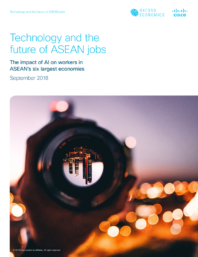
Technology and the future of ASEAN jobs

Oxford Economics and Cisco Summary:
Over the next decade, innovations in digital technology will present vast opportunities to ASEAN economies to boost their productivity and prosperity. The more widespread adoption of existing technologies, coupled with advances in the use of artificial intelligence (AI) through software, hardware, and robotics, has the potential to transform business capabilities. As a youthful region (half the 630 million inhabitants are aged under 30) with an internationally competitive manufacturing sector and innovative enterprises, ASEAN is poised to take advantage. However, digital transformation will also mean that many of the region’s workers face considerable upheaval.
To better understand these opportunities and challenges, Cisco has worked with Oxford Economics to explore what the next decade of technological change will mean for ASEAN workers. We assembled a multidisciplinary team of experts from across the region to advise on the role technology will play in different industries and occupations. We then leveraged data on 433 occupations across 21 industries to model the impact of these technology adoption patterns on the 275 million full-time equivalent (FTE) workers employed in the six largest ASEAN economies (ASEAN-6) by 2028.
- Issues:
- Demography, Urbanization and Migration, Economics, Technological innovation
- Regions:
- Asia Pacific, Asia
- Countries:
- Indonesia, Philippines, Singapore, Thailand, Vietnam, Malaysia
- Year Published:
- 2018
- Institutions:
- Cisco, Oxford Economics

